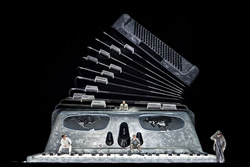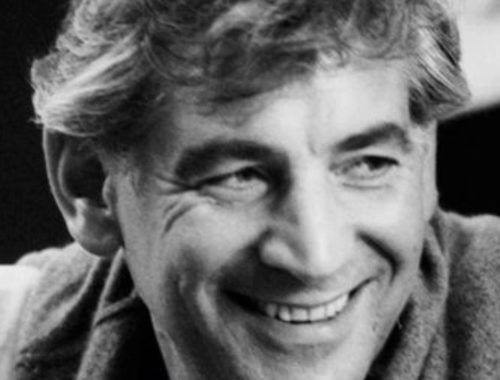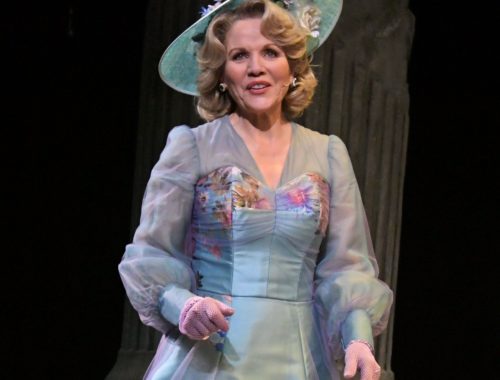Martinu “Julietta”, English National Opera – Review ****
 Julietta. The name is spelt out across the front cloth in the shifting body shapes of a sleeping figure – Michel Lepic, a bookseller (Peter Hoare). He stirs where the final “A” should be and with a suitcase packed full of dreams goes in search of his “eternal feminine” to a small French coastal town he once visited where dreams are stolen and amnesia rules. The sound of a piano accordion – itself so redolent of Frenchness – is the music that keeps memories alive, but only a for a few moments. Reality is lost in dreams and dreams in reality. And at English National Opera Martinu’s strangely seductive opera (after the play by Georges Neveux) finds Richard Jones and his designer Antony McDonald in surrealist heaven, a giant piano accordion dominating the stage in all three acts, its bellows opening like the pages of a book into which we can and will lose ourselves. A book of dreams.
Julietta. The name is spelt out across the front cloth in the shifting body shapes of a sleeping figure – Michel Lepic, a bookseller (Peter Hoare). He stirs where the final “A” should be and with a suitcase packed full of dreams goes in search of his “eternal feminine” to a small French coastal town he once visited where dreams are stolen and amnesia rules. The sound of a piano accordion – itself so redolent of Frenchness – is the music that keeps memories alive, but only a for a few moments. Reality is lost in dreams and dreams in reality. And at English National Opera Martinu’s strangely seductive opera (after the play by Georges Neveux) finds Richard Jones and his designer Antony McDonald in surrealist heaven, a giant piano accordion dominating the stage in all three acts, its bellows opening like the pages of a book into which we can and will lose ourselves. A book of dreams.
This is Jones‘ world – he deals in dreams – and it would be hard to imagine another director better able to physicalise Martinu’s vision in the theatre. It’s a piece entirely about the elusive, the intangible, the ephemeral. The character of Julietta (beautifully voiced by ENO Harewood Artist Julia Sporsèn) symbolises the romance, the infatuation, the passion, the true love we all seek and hope to find. Sometimes it exists only in our dreams and for the character of Michel (Martinu’s alter ego) the dream may be as close as he will ever get to the reality. He may have been cheated. His reality may have been stolen as surely as his dreams.
Jones is one of the great “listeners” among opera directors. He shows his infatuation for Martinu’s whirring kaleidoscopic sound world by sometimes quite literally putting it on the stage. There is the piano accordion, of course, but there is also the solo horn of rapture and transcendence which Jones has wandering through the action as if he has somehow strayed from Martinu’s orchestra and might never find his way back. But most importantly there is the piano – the songful sound of romance – which Martinu so memorably associates with Julietta and which Jones, in a moment of surrealist gorgeousness, turns into a quiet coup de theatre as she floats through the starlit forest of dreams seated at a grand piano.
This extraordinary heart of the second act is almost entirely piano accompanied as the Seller of Memories (Andrew Shore – the best diction in the business) recalls the rapture of young love for the elderly who have long forgotten that they ever experienced it. It’s a cruel but strangely moving sequence which hints at dementia and all our lost years and Jones handles it with great tenderness. At the end of each act, in the dying moments of the stage action, the house lights come up as if we the audience have awakened from our own dreams.
And so we have. Edward Gardner and the ENO Orchestra are transporting in the painting of Martinu’s orchestral dreamscapes and I will not forget in a hurry the sheer ecstasy of the moment Michel and Julietta rush once more into each others arms. This isn’t a perfect piece – I am not convinced dramatically by the Central Bureau of Dreams sequence in the last act (though Jones has a brilliant idea for it) – but Michel’s final rejection of reality has Peter Hoare thrillingly extolling the Julietta of his dreams as Jones simply but unforgettably brings the piece full circle. I doubt we’ll ever see it better done.
[Image: production shot of Julietta performed at Grand Théâtre de Genève taken from ENO Flickr feed . All images: Yunus Durukan]
Adam Guettel and friends
You May Also Like

Julie’s “sprechstimme”
09/05/2010
GRAMOPHONE Feature: Bernstein The Composer
15/08/2018